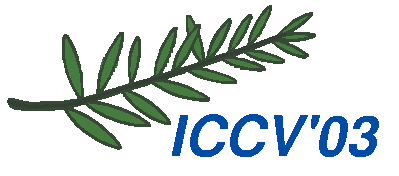ICCV 2003 Short Course
Dense Multiview Stereo
Instructors: Steve Seitz
(University of Washington), Richard Szeliski
(Microsoft Research) and Ramin
Zabih (Cornell University).
Duration: 3.5 hours
Course Content
While the classical vision problem of 2-camera stereo has been
studied for decades, in the last few years there has been a surge of
interest in dense shape reconstruction from multiple views. The course
will begin with an introduction to stereo matching, setting up the
problem as one of finding correspondences among multiple images and
constructing a 3D model. After a short discussion of rectification, we
will give a taxonomy of dense stereo algorithms into local and global
algorithms. We will then introduce issues pertaining to baseline
(tradeoff accuracy vs. search) to motivate multi-baseline
stereo. This naturally leads to the issue of visibility, which we
analyze within a volume-based framework. We will cover the concepts
of photo-consistency and visual hulls, and several multiview
algorithms including voxel coloring, space carving, and level
sets. Finally, we will discuss in some detail a recent group of
algorithms, based on graph cuts, that allow the incorporation of
spatial smoothness into dense multiview stereo.
Biographies
Steve Seitz is an Associate Professor in the Department of
Computer Science and Engineering at the University of Washington. He
received his B.A. in computer science and mathematics at the
University of California, Berkeley in 1991 and his Ph.D. in computer
sciences at the University of Wisconsin, Madison in 1997. Following
his doctoral work, he spent one year visiting the Vision Technology
Group at Microsoft Research, and subsequently two years as an
Assistant Professor in the Robotics Institute at Carnegie Mellon
University. He joined the faculty at the University of Washington in
July 2000. He was twice awarded the David Marr Prize for the best
paper at the International Conference of Computer Vision, and has
received an NSF Career Award, an ONR Young Investigator Award, and an
Alfred P. Sloan Fellowship.
Richard Szeliski is a Senior Researcher in the Interactive Visual
Media Group at Microsoft Research, where he is pursuing research in 3-D
computer vision, video scene analysis, and image-based rendering. He
received a Ph. D. degree in Computer Science from Carnegie Mellon
University, Pittsburgh, in 1988. Dr. Szeliski has published over 100
research papers in computer vision, computer graphics, medical imaging,
neural nets, and parallel numerical algorithms, as well as the book
Bayesian Modeling of Uncertainty in Low-Level Vision. He is on the
editorial board of the International Journal of Computer Vision, and
served as Program Chair for ICCV'2001, organizer of the ICCV'99 Workshop
on Vision Algorithms, and Associate Editor of the IEEE Transactions on
Pattern Analysis and Machine Intelligence.
Ramin Zabih is an Associate Professor in the Computer Science
Department at Cornell University. He received undergraduate degrees in
computer and in mathematics, and a master's in computer science, at MIT,
followed by a Ph.D. in computer science from Stanford in 1994. His
research has focused on the use of graph algorithms to solve problems in
low-level vision. He organized the ICCV'99 Workshop on Graph Algorithms
and Computer Vision, and co-edited a special issue of the IEEE
Transactions on Pattern Analysis and Machine Intelligence on this topic.
He shared the best paper award at the European Conference on Computer
Vision in 2002 for a pair of papers describing the use of graph
algorithms to compute dense multiview stereo.
